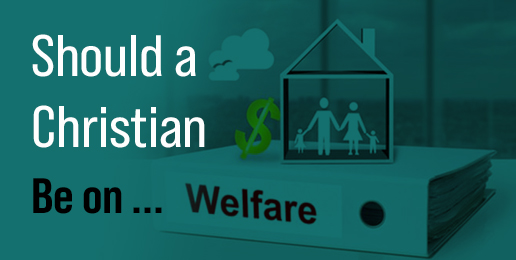
There is a Biblical theology of charity for the poor, just as there is a Biblical theology of everything.
A Biblical Theology of Work
First, there is a Biblical theology of work.
“Let the thief no longer steal, but rather let him labor, doing honest work with his own hands, so that he may have something to share with anyone in need.” (Eph. 4:28, NLT).
God’s ultimate plan for our lives is that we work and have money to give, rather than being dependent on other people.
“A hard worker has plenty of food, but a person who chases fantasies has no sense.” (Prov. 12:11, NLT).
“Work hard and become a leader; be lazy and become a slave.” (Prov. 12:24, NLT).
“Lazy people want much but get little, but those who work hard will prosper.” (Prov. 13:4, NLT).
The general principle is that adequate work will be met with adequate provision. There are obvious exceptions to this generality, such as times of national economic depression, natural disasters, unemployment or underemployment that cannot be controlled, etc. But as a rule, we are encouraged to work rather than following get-rich-quick schemes or just thinking about work (rather than doing it).
God’s Heart for the Poor
We see God’s heart in the OT in commanding His people to care for the poor:
“For the Lord your God will bless you, as he promised you, and you shall lend to many nations, but you shall not borrow, and you shall rule over many nations, but they shall not rule over you. If among you, one of your brothers should become poor, in any of your towns within your land that the Lord your God is giving you, you shall not harden your heart or shut your hand against your poor brother, but you shall open your hand to him and lend him sufficient for his need, whatever it may be. Take care lest there be an unworthy thought in your heart…You shall give to him freely, and your heart shall not be grudging when you give to him, because for this the Lord your God will bless you in all your work and in all that you undertake. For there will never cease to be poor in the land. Therefore I command you, ‘You shall open wide your hand to your brother, to the needy and to the poor, in your land’” (Deut. 15:7-11).
“Whoever oppresses a poor man insults his Maker, but he who is generous to the needy honors him” (Prov. 14:31, ESV).
“Whoever gives to the poor will lack nothing, but those who close their eyes to poverty will be cursed” (Prov. 28:27, NLT).
Providing for the poor is a Biblical mandate for Christians.
“So clean the inside by giving gifts to the poor, and you will be clean all over” (Lk. 11:41, NLT).
The early church made sure they took care of financial needs within the Body.
“They sold their property and possessions and shared the money with those in need” (Acts 2:45, NLT)
Who is Responsible for the Poor in Society?
Taking care of the poor in the New Testament is predominantly a family government responsibility (rather than the Church and is never a responsibility given in the NT to the civil government).
“But if anyone does not provide for his relatives, and especially for members of his household, he has denied the faith and is worse than an unbeliever” (1 Tim. 5:8, ESV).
In the NT, the early church (as a collective body) would help individuals and families who needed temporary financial assistance from funds donated by the congregation. The early church did not, however, subsidize anyone (with donated church funds) on an ongoing basis except for “widows indeed” (older widows who met certain criteria). All other long-term charity was expected to be the responsibility of the family.
“If any believing woman has relatives who are widows, let her care for them. Let the church not be burdened, so that it may care for those who are truly widows” (1 Tim. 5:16, ESV).
The Government Has No Money
It must be remembered that the only money the civil government has is what it takes by force from some citizens to redistribute to another citizen. Any government welfare is predicated upon a forced redistribution of wealth. When the Apostle Paul was teaching the Corinthian church on a Biblical theology of charity, he insisted that charity should never be funded through compulsion (which government welfare intrinsically is).
So, government welfare violates an important Biblical principle of free-will in giving.
“Each one must give as he has decided in his heart, not reluctantly or under compulsion, for God loves a cheerful giver” (2 Cor. 9:7, ESV)
From a practical standpoint, many families have felt forced economically into government assistance over time out of dire necessity. Many of our current politicians are crafting and creating an economic climate that is designed to push citizens into government dependence. Those who hold to a Marxist worldview actually WANT people to be dependent on the government and create economic policies that help create dependency.
When the government gets involved in industries like health care or public education it drives the cost up so high that many can no longer afford privately funded options. Far from being “benevolent” these “free” government programs (nothing from the government is ever actually free, it is just being paid for by our neighbor rather than us), these programs create more poverty and multi-generational government dependency in the long run, rather than alleviating poverty.
A Christian who finds himself or herself dependent on the government should pray and seek to rid himself from that entanglement is quickly as possible.
A Christian should first seek assistance from their own relatives and then their church before they seek funding from the government.
An Entitlement Mentality
Many Christians see government welfare as a right or entitlement. “I pay into the system, so I should have a right to benefit from it!” While this argument seems sound on the surface, in most case, people who are in a financial bracket to receive government aid, are also not in a financial bracket that requires them to pay significant taxes into the system.
Most families who are using government aid are receiving far more than they have contributed, with means they are, in fact, forcing others to pay for their care.
Again, this is not true charity. True Biblical charity is only ever what people have willingly and voluntarily given and contributed for the care of others, not what was taken from them under duress.
Trust God to Provide and Word Diligently!
When I was young, I had a step-father who refused to work. He was more than willing to sit back and let his neighbors pay for his support. It was embarrassing to be dependent on government support when I was growing up.
In those days “government food” came in plain white and black boxes (or cans) and most of it tasted awful. I hated the fact that we lacked choice and had to ask for handouts. My mother became a Christian when I was 12 and she told us that believed we were going to be alone soon we needed to trust God to take care of us.
“I have been young, and now am old, yet I have not seen the righteous forsaken or his children begging for bread” (Ps. 37:25).
“Father of the fatherless and protector of widows is God in his holy habitation” (Ps. 68:5, ESV).
“And my God will supply every need of yours according to his riches in glory in Christ Jesus” (Philippians 4:19, ESV).
She started her own business the next year and prayed for God to use it to provide for us. He did! She founded a very successful Christian publishing company (for which I ended up working as the Marketing Director for 20 years).
After starting her business, she created her own bank account (having access to funds for the first time in her marriage) and never again relied on government assistance, even when she became a single parent of six children when I turned 15. It is God’s desire to show Himself strong on behalf of his children, but we so seldom truly turn to Him and allow Him the opportunity to perform miracles on our behalf.
I don’t want someone who simply has no choice to feel undo guilt for being on government welfare (no one wants their child to starve, so I get that). But in the overall view of things, God does not desire for His people to live in dependency on others, and especially on a godless governmental system that desires to enslave them and take away their choices.
Having money and avoiding debt enables you to make the best choices for your family. The general path for this is labor. You may need to be willing to take drastic measures like relocating and/or choosing a new career path to be able to adequately provide for your family.
“And to aspire to live quietly, and to mind your own affairs, and to work with your hands, as we instructed you, so that you may walk properly before outsiders and be dependent on no one” (1 Thess. 4:11-12, ESV).





















